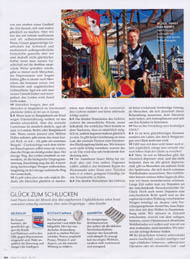







VF You claim that it is possible to eradicate all suffering on earth, whether physical or mental. When?
D.P. It will technically be possible to get rid of all suffering within a century or two. Its abolition would be practical only if it were agreed in the sense of something like the moon program or the human genome project – if there was a degree of social consensus. There are certainly technological obstacles, but they are dwarfed by the ethical-ideological ones. Many people’s negative reaction to the idea of a world without suffering comes from a fear that someone is going to be manipulating and controlling them. Partly, too, the abolition of suffering seems to make a mockery of one’s life projects. Most of us spend the greater part of our lives seeking happiness for ourself and others we care about. But we do so in extremely inefficient and in many cases self-defeating ways. This is a problem with existing human society. Even though we have made extraordinary progress technologically and medically, we aren’t any happier than our ancestors. Even if we could arrange society in the most utopian way imaginable, there would be some people who would still be depressed and anxious. There would be some people who would be consumed by jealousy or unhappy love affairs. No amount of environmental reform or manipulation is going to get rid of suffering. Only biotechnology can eradicate its neural substrates.
VF Statistics say that on the average people in Bangladesh are happier than in the Western World.
D.P. In Bangladesh, if you lose a child through malnourishment or disease it’s absolutely dreadful, just as it is if you lose a child here. But yes, statistically the hedonic set-point around which our lives fluctuate is pretty similar whether you live in London, Berlin or Bangladesh. If someone offers you a million dollars, for instance, you get a quick boost in the same way that (to use a more extreme example) crack-addicts do. Even though crack-addicts know that the drug is going to make them awfully miserable in the long-term, they still strive for their next hit. Here in the rich West, we know money won’t make us happy, but we strive for it compulsively.
If you take suffering seriously, the only way to eradicate it is by biological reprogramming. In the short run, this may involve superior designer drugs. In the long run, the only realistic way to abolish suffering is through genetic engineering.
VF There would be a very simple method to make all people happy straight away: by putting electrodes in their pleasure centres.
D.P. Wireheading is offensive to human dignity, to our conception of who we are. The real value of wireheading is that it serves as an existence-proof for people who are sceptical that it is possible to be extremely happy indefinitely. Wireheading shows there is no tolerance to pure pleasure. The normal process of inhibitory feedback doesn’t seem to kick in. We don’t understand why this is the case. When we do, it will be a very important discovery.
VF The anaesthetist Stuart Meloy discovered accidentally that by putting an electrode in a certain area of the spinal cord a woman could experience endless orgasms. But he had a hard time finding enough people volunteering for a trial.
D.P. I can’t see wireheading as an evolutionary stable solution. Wireheads will not want to have children, or want to look after their children.
VF But what is your idea of paradise engineering? What should an ever-happy life be like?
D.P. It is not a uniform happiness but a world with a motivational system based entirely on gradients of well-being. Think of your ideal fantasy. With the right biological substrates, the reality could be millions of times better.
VF As long as you are still trying to achieve a higher level of bliss, don’t you feel relatively unhappy?
D.P. No. Compare how there are some people today who are chronically depressed. This doesn’t mean that they endure the same level of depression each day. But days that are less bad than others aren’t thereby “happy” days. It’s the same with people at the other end of the spectrum - whose default state is extreme well-being. Some things make them feel even better than others, and there are still going to be dips in their well-being. But the dips can still be, in principle, far higher than anything we normally experience today.
There used to be a theory that identified dopamine as the key player, the key neurotransmitter of happiness. Although dopamine plays an important role, and it’s implicated in the euphoric effects of various drugs, there is also quite a lot of research associating dopamine with “wanting”. Activation of the mu opioid receptor is associated with “liking”. Crudely, any paradise engineering project has to decide how much tranquil, serene, “opiated” well-being we want and how much driven, motivated “dopaminergic” well-being. Getting the balance right is critical. If the dopaminergic state is over-amplified it can even be unpleasant. So it’s got to be very finely calibrated.
VF Regarding physical pain our society differs between pain that is not necessary and should be reduced – when there’s a surgery or when you have chronic pain – and pain that delivers useful information: we hit something and it hurts.
D.P. You can have a silicon etc robot that is responsive to noxious stimuli and there is no indication that it suffers. The “raw feel” of suffering isn’t essential to a functional response. So why must the nasty “raw feel” of suffering always be essential to ours? A dip in well-being can perform the same information-signalling role. Of course, when one talks loosely of turning people into robots, this conjures up images of diminished sensibility, a lack of body sense, whereas with the right prostheses one could have an enhanced body image, a greater responsiveness to a wider range of physical stimuli.
VF As these posthuman beings are emotionally independent: How do they relate to others?
D.P. Our descendants will be smarter and happier. Whether we will be nicer is much more controversial. One might imagine that getting rid of suffering would entail a completely egotistical form of well-being. Indeed in one sense, there would be no need for compassion any more if suffering didn’t exist. But this scenario is only one option – and not an option that I personally find attractive. Instead, one can imagine forms of life-long well-being that are profoundly empathetic. Imagine a profoundly loving, MDMA-like consciousness. Unfortunately, taking MDMA today is not the recipe either for an ideal self or for society as a whole - because of its short duration and long-term toxic effects. But gene therapies that deliver safe, sustainable MDMA-like personalities will be feasible in future.
VF Will it at some point be forbidden to have children in a natural way and with a predisposition to suffer?
D.P. Could there come a time when a parent who wants to have a child “naturally” - and thereby exposes the child to the risk of various forms of psychological distress – could this be regarded as akin to child abuse? The answer is: Yes, in theory. In practice, when we are free to choose the genetic make up of our kids, I think most parents will choose to have happy children rather than anxiety-ridden or depressive children.
VF Those who procreate most are normally those who are most conservative and religious and who might neglect genetic engineering in general.
D.P. Here we come to another technological development that is going to unfold over the next few centuries - whether you are sympathetic to paradise engineering or not. Thanks to biotechnology, we are going to phase out the aging process. In a post-aging society, some form of central regulatory control over reproduction is going to be essential. Otherwise the Earth will exceed its carrying capacity. Now if you ask people today, most would say that they wouldn’t want to live forever, that they don’t mind growing old and dying. But in fact this reply is a rationalisation. If the opportunity of eternal youth is ever there, people will take it. And if we do phase out aging, then extraordinarily tight central control over all reproduction is inevitable.
VF What about the suffering of animals?
D.P. When it is possible to produce genetically engineered “vat food” that is both tastier and cheaper than food from intact animals, you are likely to see a switch to global veganism. It’s likely that this technological development is going to happen in the next 50 years.
VF And do you want all animals to become vegans, too?
D.P. Fanciful as it sounds, yes – though this switch would require massive genetic rewrites and ecosystem redesign. In terms of Nature, I’m not a great one for romanticizing wildlife - which is often pretty brutal. We’re inconsistent. People think cats are beautiful and forgive them for tormenting mice. But to someone who, say, romanticizes blond Aryan supermen in their occasional savagery we would be less forgiving. If I pass a butcher-shop, to be honest, I think of Auschwitz. Yes, the non-human animals that we raise in factory farms and kill are not particularly intelligent; but they suffer horribly, just like human babies and toddlers. We tend to associate intensity of consciousness with intelligence. In fact the most distinctively intelligent human traits like our language capacity or mathematics – their accessibility to introspection is very subtle at best. Whereas the most intense emotions like pain, thirst and hunger tend to be extremely primitive. It’s doubtful whether a pig, for instance, suffers any less than a human infant.
VF Isn’t redesigning the whole nature a task that will ever be just too complex?
D.P. Essentially, in 50 years or so all that’s left of “Nature” is going to be our wildlife parks. What we will actually allow in our wildlife parks is debatable. Already in zoos we don’t feed live animals to snakes or crocodiles even though it would fulfil their “natural” instincts.
VF Animals won’t have natural enemies any more. They will just procreate.
D.P. Already the elephant population in a few parts of Africa has recovered sufficiently such that techniques such as depot-contraception have been introduced – in preference to cruel “culling”. Ultimately a whole ecosystem could be managed in the same way.
VF Elephants are big and rare mammals. But what about flies?
D.P. It’s unlikely a fly has any unitary consciousness since it lacks a unitary nervous system. But in the long-term, I think we should abolish all unpleasantness. Even frogs eating flies can be abolished. This is a distant goal and not a priority, but imagine you had the god-like technological power of our descendants. Of all the possible ways to arrange matter and energy and consciousness, is arranging flies to be eaten by frogs worth sustaining?
VF 70 per cent of the earth’s surface is oceans. How should one gain control of all life in there?
D.P. Now that really is a mega-project. The abolition of suffering in humans is likely to occur incrementally via a reproductive revolution of designer babies without necessarily any centralised state direction. But paradise engineering for the oceans would take strategic planning and the use of nanotechnology.
[original VF interview in German] * * *
HOME
Books
David Pearce
DP Interview (Neofiles)
DP Interview (Nanoaging)
Dazed and Confused 2011
DP Quora Answers (2015-25)
DP Interview (El Mercurio 2016)
DP plus NB Interview (Cronopis)
DP Social Media Postings (2013-2025)HOTLINKS
BLTC Research
Vanity Fair Online
The Abolitionist Project
The Hedonistic Imperative
World Transhumanist Association/H+
DP Sentience Research Interview (2019)E-mail Dave
dave@hedweb.com